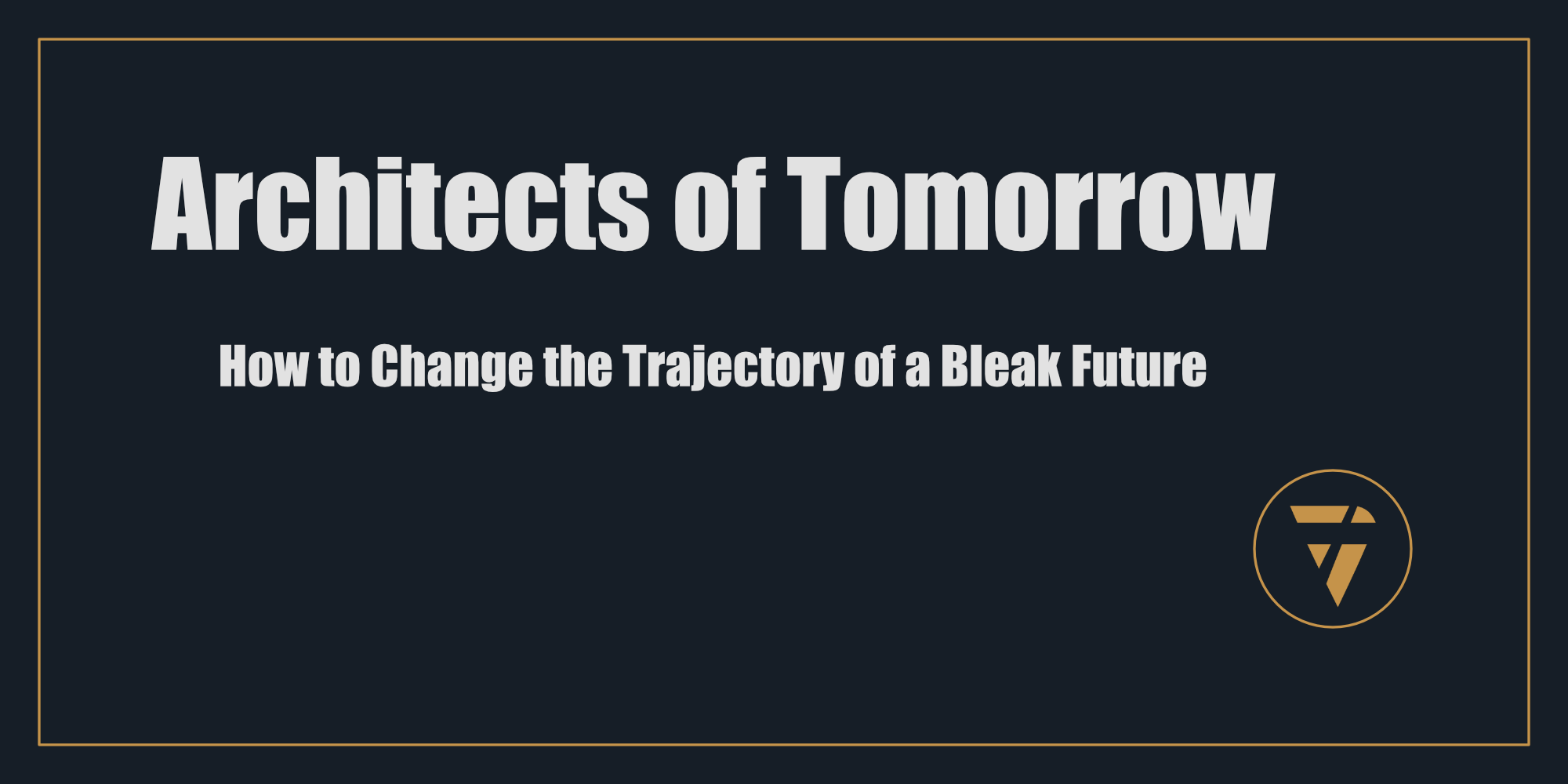Architects of Tomorrow

How to Change the Trajectory of a Bleak Future
There are nights when the weight of the world presses in—when the headlines feel like they’ve been lifted from a dystopian novel, and the idea of the future evokes more dread than excitement. It’s easy to feel like we are spectators, watching as power consolidates in the hands of a few, as wealth gaps widen, as technology moves faster than regulation, and as the people shaping tomorrow seem more interested in control than progress.
But history, and business, and human progress, have always been about interventions—pivotal moments where a single decision, a single movement, or a single alternative altered the course of what once seemed inevitable.
If you’re lying awake at night worrying that the world is heading toward a future ruled by oligarchs and monopolists, I want to tell you something fundamental: we are not doomed, but we do need to act with urgency.
The dystopian future isn’t inevitable—it’s just one possible trajectory. If we recognize that, we can bend the arc of history toward something better. Here’s how.
Step One: Reclaim Agency—You Are Not Powerless
The first and most important thing to remember is that dystopias do not emerge overnight. They are built, step by step, through thousands of seemingly small decisions—decisions made by corporations, politicians, and, crucially, by us.
Right now, it may feel like the tools of influence, money, and technology are concentrated in the hands of people like Musk and Trump. And yes, their influence is massive. But systems don’t change because we beg them to. They change because alternatives emerge that render the old models obsolete.
The world we want will not be handed to us. It will be built.
Three Core Truths to Anchor Your Thinking:
- All systems can be disrupted—Monopolies feel insurmountable until they aren’t. Power feels permanent until it isn’t. The lesson of history is that no empire, no company, and no dominant ideology lasts forever.
- Money follows alternatives—People will fund alternatives when they exist. Big Tech, centralized media, and monopolized industries thrive because they lack competition. The second a viable, profitable, ethical competitor rises, the landscape shifts.
- Networks beat individuals—No single person will “fix” the future, but well-organized movements, communities, and businesses can outmaneuver monopolies.
You may not be able to single-handedly dethrone the titans of industry. But you can support, build, and participate in the alternatives that will.
Step Two: Build Parallel Systems, Not Just Resistance
The mistake many movements make is in only fighting the system instead of replacing it. Rebellion alone does not create change—new models do.
Where Change Needs to Happen (and How to Act on It Today):
1. Media & Information: Stop Feeding the Machine
The way people see the world is dictated by the stories they consume. And right now, those stories are controlled by a handful of corporations that thrive on outrage, division, and maintaining the status quo.
Action Steps:
- Support decentralized media. Subscribe to independent newsletters, platforms like Substack, and community-driven journalism.
- Own your platforms. Build on open-source and community-owned platforms instead of relying on Facebook, X (Twitter), or Google-controlled media.
- Stop doomscrolling. Engage with solutions-oriented media instead of outrage-driven content designed to keep you passive.
2. Economics: Change Where Money Flows
Every dollar you spend is a vote for the world you want. The monopolies of the future will only exist if people continue feeding them today.
Action Steps:
- Redirect spending: Support businesses that prioritize ethical practices, worker ownership, and decentralization.
- Invest in alternatives: Crowdfund, back, or support businesses that disrupt monopolies. (Alternative capital structures can fund game-changing ventures.)
- Embrace profit-sharing models: The future of business must be more equitable. Offer an alternative where wealth is shared among stakeholders, rather than extracted by the few.
3. Technology: Decentralize Power
Musk doesn’t need to own the future of AI. The metaverse doesn’t need to belong to Zuckerberg. But that means we need to support open alternatives.
Action Steps:
- Move toward open-source tools. Support tech that doesn’t consolidate power in a single entity.
- Build digital sovereignty. Consider alternative platforms for everything—search, messaging, AI, payments.
- Challenge AI monopolization. AI is the defining technology of the next era. Open AI must remain open, or else the future of intelligence itself will be privatized.
Step Three: Develop Strategic Mindfulness
Fear, anxiety, and hopelessness are not strategies. If you are overwhelmed by the trajectory of the world, you are likely caught in a reactive mindset, rather than a proactive one.
How to Shift From Anxiety to Strategic Action:
- Practice awareness: Recognize when you are passively consuming dystopian narratives instead of actively building solutions.
- Strengthen decision-making: Mindfulness is not just a wellness tool—it’s a business strategy that allows leaders to make sharper, long-term decisions.
- Engage with purpose: Stop feeling like a powerless observer, and start acting like an architect of the future.
Step Four: Scale Through Profitable Partnerships
Movements die without scale. Ideas die without infrastructure. Businesses die without funding.
The solution? Strategic partnerships.
The key to real, sustainable disruption isn’t lone-wolf activism—it’s collaboration between aligned forces.
How to Build Power Through Partnerships:
- Find aligned players—Identify businesses, organizations, and thought leaders working toward the same future.
- Combine strengths—Partnerships allow emerging movements to compete at scale with monopolies.
- Use market forces against them—If the alternative is better than the monopoly, people will choose it. The key is to make the right choices easier.
Sleep Better, Work Smarter, Build Brighter
If you’re lying awake, feeling like we are headed toward an inevitable dystopia, remember this: No future is inevitable. The only thing that ensures a monopolistic, authoritarian future is our inaction.
Your anxiety about the future is a signal. It means you care. And if you care, you are in a position to act.
So here is your next step:
- Choose one area to influence—media, economics, technology, leadership.
- Start supporting, funding, or building something that shifts power away from monopolies.
- Find partners, allies, and communities that are doing the same.
The future isn’t written—it’s built. And the architects of tomorrow? They’re the ones who refuse to believe the script is already finished.
So stop watching.
Start building.
And let them be the ones who lose sleep over us.
This is what I’m working on. Tell me what you think, I enjoy the conversation! Subscribe and follow the work in real time.
Thanks!
B

Dystopia isn't inevitable. It's just one possible future. The real question: who’s building the alternatives? Stop watching. Start creating. The architects of tomorrow won’t be the ones who accept the script—they’ll be the ones who rewrite it.
PS -






